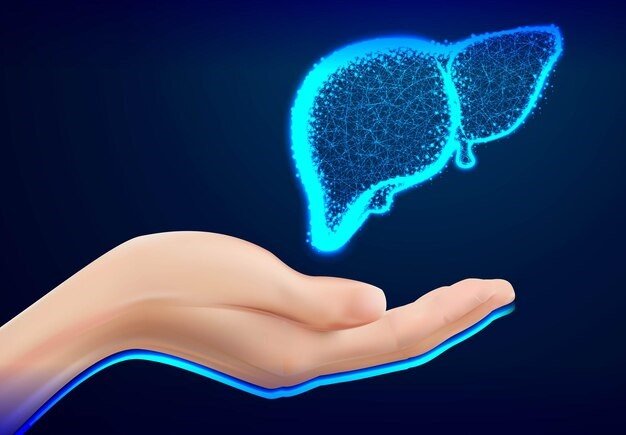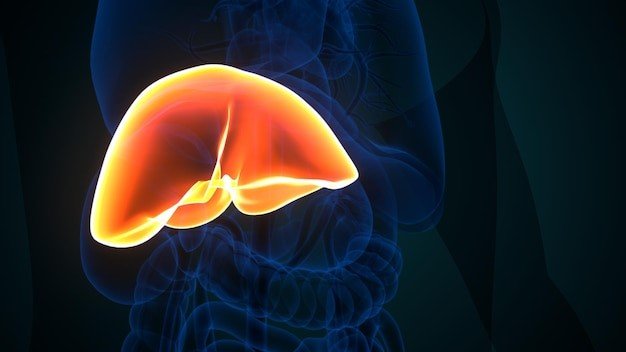Psychological Factors Have on Liver Health
Medical research done by the best liver transplant hospital in India on the complex relationship between psychological influences on liver disease is fascinating. Beyond its traditional links to lifestyle and diet, the liver’s health is also known to be impacted by a wide range of psychological factors and liver health. Stress, anxiety, sadness, and even personality characteristics can affect liver function through complex hormonal, immunological, and behavioral response pathways. Examining these relationships highlights the comprehensive aspect of health and the critical role that mental health plays in preserving the best possible physiological function.
Understanding the Psychological-Physiological Connection

Studying the psychological-physiological relationship entails investigating the complex interplay between the mind and body and how our mental, emotional, and behavioural states affect our physical well-being and vice versa. This relationship emphasizes the essential idea of holistic well-being, which holds that mental and emotional states have a deep influence on physical functioning and that physical health has a substantial impact on mental and emotional states.
Psychoneuroimmunology and psychosomatic medicine research at the best liver transplant clinic, affiliated with Liver Treatment India, provide light on the ways in which psychological variables, including trauma, stress, and anxiety, can cause physical symptoms or worsen pre-existing medical disorders. Chronic stress, for example, can dysregulate the body’s stress response systems, which can worsen immunological function, raise the risk of cardiovascular disease, and increase inflammation. Unresolved emotional trauma can also cause physical symptoms or persistent discomfort, emphasizing the connection between mental and physical health.
On the other hand, psychologically oriented interventions, like cognitive-behavioural therapy, mindfulness exercises, and stress reduction methods, have shown effectiveness in improving a range of physiological outcomes, from pain relief and blood pressure reduction to immune system stimulation and improved healing after disease or injury.
Bidirectional Relationship Between Mental Health and Liver Functioning

In addition to being widely known for its functions in metabolism and detoxification, the liver is essential for preserving general health, which includes impact of mental health on liver. In contrast, there exists a dynamic interplay between the impact of mental health on liver, since mental health diseases can have a major impact on liver function and vice versa.
On one hand, mental health conditions like anxiety, depression, and long-term impact of stress liver health can impede liver function. For example, extended periods of stress cause the release of stress hormones like cortisol, which can interfere with liver function and raise the risk of diseases like fatty liver disease. Furthermore, impact of mental health on liver is exacerbated using unhealthy coping techniques like binge drinking large amounts of alcohol or following bad eating habits.
On the other hand, liver disease can also have a significant i impact of mental health on liver. The liver is essential for removing toxins from the bloodstream, such as waste products from metabolism and dangerous compounds consumed through food and drink. These toxins can build up in the body when the liver is damaged, which can result in hepatic encephalopathy. This can have a serious negative influence on a person’s mental health and quality of life and show up as mood swings, cognitive impairment, or even psychosis.
Moreover, a higher incidence of psychiatric problems has been linked to certain liver abnormalities, such as liver cirrhosis or hepatitis C infection. Mental health can suffer as a result of the impact of stress liver health of managing a chronic illness such as liver disease, which can result in feelings of anxiety, melancholy, and decreased general well-being.
Psychological Factors Affecting Liver Health

Comprehending the complex relationship between psychological factors and liver health is essential to addressing total well-being in its entirety. Though historically considered primarily a medical issue, current studies conducted by one of Liver Treatment India’s associates, best liver transplant doctor in India highlight the significant influence of psychological factors and liver health and the course of the disease. The psychological factors and liver health has a profound impact on liver health, influencing everything from stress-induced inflammation to maladaptive coping strategies that drive dangerous behaviours, such excessive alcohol consumption or poor nutritional choices. Best liver transplant doctor in India associated with Liver Treatment India examines this complex relationship which opens up possibilities for comprehensive therapies promoting psychological and physical resilience for the best possible liver health and function.
Chronic Stress

An ongoing condition of elevated psychological strain known as chronic stress can have a substantial effect on many facets of human health, including the liver’s ability to operate as one of the body’s essential organs. Often referred to as the body’s metabolic powerhouse, the liver is essential for the digestion of food, the detoxification of toxic chemicals, and the control of blood sugar levels. Impact of stress liver health or prolonged stress exposure, however, can interfere with these complex processes and have a negative impact on liver health.
Stress chemicals like cortisol and adrenaline are released, which is one of the main ways that long-term stress affects liver function. Although these hormones are necessary in the short term for the body to mount a fight-or-flight response, long-term increase brought on by chronic stress can lead to metabolic imbalance and hepatic inflammation. The ongoing activation of the stress response system has the potential to upset the delicate balance of many signalling pathways related to liver homeostasis, which will ultimately make the liver less capable of carrying out vital tasks.
Furthermore, long-term stress can worsen pre-existing liver diseases or raise the risk of developing liver disorders such alcoholic liver disease (ALD) and non-alcoholic fatty liver disease (NAFLD). Research at the best liver transplant clinic has shown that people who are under a prolonged stress are more likely to participate in harmful habits including binge drinking, overeating, and leading sedentary lives, all of which can worsen liver damage. Furthermore, dietary modifications brought on by stress and modifications in the makeup of the gut microbiota may aid in the onset and advancement of liver illnesses.
Moreover, long-term stress has been linked to immune system dysregulation, which results in persistent low-grade inflammation—a characteristic of numerous liver diseases. Liver inflammation can lead to oxidative stress, fat deposition, and fibrosis, which can all lead to more serious diseases including liver cancer and cirrhosis. Furthermore, changes in intestinal barrier function and gut permeability brought on by stress may cause bacteria and their byproducts to translocate into the liver, aggravating tissue damage and inflammation.
Anxiety and Depression

Stress hormones like cortisol and adrenaline are released, along with other physiological reactions that are frequently triggered by anxiety affects liver function and sadness as well. Extended increase of these hormones can cause oxidative stress and inflammation by interfering with the liver’s regular metabolic functions. Over time, this oxidative stress can harm and impair the function of liver cells, which may play a role in the onset or worsening of liver illnesses such cirrhosis, hepatitis, and fatty liver disease.
Furthermore, people who experience anxiety or depression may resort to harmful coping strategies like binge drinking large amounts of alcohol or making unhealthy food choices, both of which can negatively impact liver function. One well-known hepatotoxin that can harm the liver and aggravate pre-existing liver disorders is alcohol. Furthermore, weight gain and metabolic abnormalities can result from the sedentary lifestyle frequently linked to depression affects liver disease, raising the risk of liver-related problems.
Moreover, data point to a critical role for the gut-brain-liver axis in the interaction between liver function and mental health. Through its effects on inflammation and immunological function, the gut microbiome—which is altered by stress and mood disorders—can have an impact on liver health. Liver problems may arise as a result of disruptions in this complex communication network between the gut, liver, and brain.
Substance Use Disorders

Anxiety affects liver function like cortisol and adrenaline are released, along with other physiological reactions that are frequently triggered by anxiety and sadness. Extended increase of these hormones can cause oxidative stress and inflammation by interfering with the liver’s regular metabolic functions. Over time, this oxidative stress can harm and impair the function of liver cells, which may play a role in the onset or worsening of liver illnesses such cirrhosis, hepatitis, and fatty liver disease.
Furthermore, people who experience anxiety affects liver function or depression may resort to harmful coping strategies like binge drinking large amounts of alcohol or making unhealthy food choices, both of which can negatively impact liver function. One well-known hepatotoxin that can harm the liver and aggravate pre-existing liver disorders is alcohol. Moreover, injecting drugs with tainted needles raises the danger of contracting viral hepatitis infections, such as hepatitis B and C, which can result in chronic liver inflammation and, if ignored, advance to liver cancer and cirrhosis.
Substance use disorders have an effect on liver health that goes beyond the physical harm that the substances themselves cause. Addicts frequently disregard their general health, which includes good diet and hygiene, which exacerbates liver damage. Furthermore, co-occurring mental health conditions including anxiety and depression affects liver disease which frequently coexist with drug use disorders, which makes liver health management even more difficult.
Behavioural and Lifestyle Implications

The liver’s resilience and susceptibility to disease are significantly shaped by behavioural and lifestyle decisions. Every aspect of our everyday lives, from eating patterns and alcohol intake to exercise routines and stress reduction, can affect the liver’s health and function. It is critical to comprehend these behavioural and lifestyle consequences in order to promote liver health and delay the development of diseases including cirrhosis, fatty liver disease, and liver cancer. This investigation explores the complex relationship between our decisions and the condition of this essential organ, providing guidance on developing lifestyle choices that support lifespan and vigour.
Unhealthy Coping Mechanisms

Overindulgence in alcohol is one such harmful coping strategy. Frequent or binge drinking can seriously damage the liver, although infrequent or moderate drinking may not present a serious risk. Since the liver is responsible for metabolizing alcohol, prolonged alcohol misuse can cause fatty liver disease, alcoholic hepatitis, and ultimately cirrhosis, which is characterized by irreparable liver tissue scarring. These illnesses raise the risk of liver cancer and liver failure in addition to compromising liver function.
Misuse of some medications or narcotics is another harmful coping strategy. When taken in excess, over-the-counter medications such as acetaminophen can harm the liver. Analogously, abusing prescribed drugs—like opioids or some psychiatric meds, for example—can similarly put undue stress on the liver. Cocaine and methamphetamine are examples of illegal drugs that can have harmful effects on the liver and increase the risk of liver disease.
Furthermore, bad eating habits and unhealthy coping strategies frequently coexist, which increases the load on the liver. Fat buildup in the liver is a defining feature of non-alcoholic fatty liver disease (NAFLD), a disorder that can be brought on by high-fat diets, excessive intake of processed foods, and sugar-filled beverages. If non-alcoholic steatohepatitis (NASH) and liver fibrosis are not treated, non-alcoholic fatty liver disease (NAFLD) may develop.
Sleep Disturbances

Lack of sleep can have a major negative effect on liver health because sleep is essential for controlling several physiological functions, including the liver. Insomnia, sleep apnea, and other chronic sleep disturbances can have a negative impact on liver function and general metabolic health.
The circadian cycle of the body is one of the main ways that sleep abnormalities impact liver health. The circadian rhythm, often known as the body’s internal clock, controls a number of biological functions, such as liver and metabolism. Sleep problems can throw off this cycle, which can cause liver enzyme dysregulation and poor glucose metabolism. According to studies done by liver expert doctors associated with Liver Treatment India, those who regularly get too little sleep or have irregular sleep patterns are more likely to develop non-alcoholic fatty liver disease (NAFLD) and other liver-related conditions.
In addition, insufficient sleep has been connected to obesity and insulin resistance, two conditions that increase the risk of liver illnesses like non-alcoholic steatohepatitis (NASH) and non-alcoholic fatty liver disease (NAFLD). The body goes through critical processes related to detoxification, tissue repair, and energy balance when you sleep. The liver’s capacity to effectively metabolize fats and poisons can be compromised by disruptions to these processes, which can result in the buildup of fat in the liver and elevated inflammation.
Moreover, sleep disorders may accelerate the onset of or exacerbate the symptoms of other liver disease risk factors, such as binge drinking and unhealthy eating patterns. For instance, those who don’t get enough sleep could be more likely to overindulge in sugary or fatty foods and make other poor dietary choices that worsen liver damage.
Adherence to Treatment

Hepatitis, which can be brought on by viral infections (hepatitis A, B, C, etc.), excessive alcohol intake, or autoimmune illnesses, is one of the most prevalent liver diseases in the world. For those with viral or autoimmune hepatitis, respectively, adherence to immunosuppressive drugs or antiviral treatments is crucial. Adhering to these drugs consistently can stop the spread of viruses, lessen inflammation in the liver, and shield the liver from developing chronic conditions like cirrhosis and fibrosis. Treatment resistance, return of the illness, and faster liver degradation can arise from noncompliance with the prescribed course of action.
Obesity, poor diet, and sedentary lifestyle are risk factors for non-alcoholic fatty liver disease (NAFLD) and its progressive form, non-alcoholic steatohepatitis (NASH). Maintaining a healthy weight, altering one’s diet, and engaging in regular exercise are all essential components in managing nonalcoholic fatty liver disease (NAFLD/NASH) and halting its progression. Adhering to dietary guidelines that minimize sugar, saturated fats, and processed foods can enhance insulin sensitivity, decrease the formation of fat in the liver, and mitigate inflammation in the liver. In a similar vein, consistent exercise can help reduce body weight, enhance insulin resistance, and lessen the liver damage brought on by NAFLD/NASH.
Adherence to treatment in patients with cirrhosis or advanced liver disease may entail a mix of food restrictions, medications, and lifestyle changes intended to control symptoms and avoid consequences such variceal hemorrhage, ascites, and hepatic encephalopathy. Following a doctor’s prescription closely can assist manage fluid retention, lower portal hypertension, and stop episodes of hepatic encephalopathy. Examples of these drugs are beta-blockers, lactulose, and diuretics. Furthermore, individuals with cirrhosis must adhere to dietary salt limitations and abstain from alcohol in order to minimize fluid retention, avoid electrolyte imbalances, and maintain liver function.
Stress Management and Psychological Interventions

In today’s fast-paced environment, navigating the maze of stress requires skilful management techniques and psychological therapies. Numerous factors, such as the demands of interpersonal relationships or work deadlines, can cause stress, which can have negative effects on one’s mental and physical health. This talk delves into the complex field of psychological treatments and stress management, examining methods and approaches meant to reduce stress and build resilience in the face of adversity.
Stress Reduction Techniques

- To lower stress levels and soothe the neurological system, engage in deep, slow breathing exercises.
- Frequent meditation can ease mental tension, encourage relaxation, and strengthen resistance to stress.
- Regular physical activity can lower stress hormones, increase mood, and release endorphins.
- Develop present-moment awareness by engaging in mindfulness exercises like body scanning and mindful eating.
- Reduce stress from feeling overburdened by properly prioritizing chores, setting reasonable goals, and organizing your workload.
- To discuss your worries and get help, reach out to friends, family, or support groups.
- To calm the body and mind, try progressive muscle relaxation, yoga, or visualization.
- To enhance general wellbeing, eat a balanced diet, get adequate sleep, and avoid alcohol and caffeine.
- To lower cortisol levels, improve mood, and obtain a new perspective on stressors, spend time in nature.
- Take part in happy and fulfilling activities that will relieve tension and encourage relaxation.
Psychotherapy

- Stress triggers can be either internal thought processes or external experiences, and psychotherapy can assist in recognizing them.
- It entails encouraging better viewpoints by opposing and modifying stress-inducing bad mental habits.
- Psychotherapy helps people learn appropriate coping mechanisms for their emotions, which lessens the negative effects of stress on mental health.
- In order to reduce stress, therapists offer coping mechanisms like time management, assertiveness training, and relaxation techniques.
- In order to create a supportive therapeutic connection that is essential for stress management, psychotherapy offers a secure place for patients to share their feelings and concerns.
- It does not provide short-term remedies; instead, it concentrates on creating long-term coping skills to manage stress.
- Through counselling, people can better understand their coping mechanisms and behavioural patterns, which gives them the ability to transform their lives for the better.
- Psychotherapy takes into account a number of factors in a person’s life, treating stress in its underlying forms as well as its manifestations.
- By bolstering psychological influences on liver disease and improving adaptive coping mechanisms, it contributes to the development of resilience against future stressors.
Integrative Approaches

- Yoga and Tai Chi: Improves body-mind connection and lowers stress hormones by combining physical postures, breathing techniques, and meditation.
- Cognitive behavioural therapy (CBT): Assists in recognizing and altering harmful thought patterns and stress-inducing behaviours.
- Biofeedback and relaxation techniques: These methods help people learn to regulate their body’s physiological reactions to stress by using feedback mechanisms to control things like heart rate and tense muscles.
- Art and music therapy: Reduces stress and fosters emotional well-being by offering a creative avenue for expression and relaxation.
- Acupuncture and acupressure: stimulate particular body spots to increase energy flow, relieve stress, and release tension.
It is clear that psychological influences on liver disease have a big impact on liver function, highlighting the complex relationship between the mind and body. While depressive, anxious, and stressed mental states might worsen liver diseases, optimistic mental states can improve general health. Understanding this interaction is essential to creating comprehensive strategies for liver care. Liver Treatment India is a ray of hope for anyone looking for extensive information and treatment choices. Liver Treatment India offers the most comprehensive support possible for those seeking liver health and vitality thanks to its extensive network & connections with liver expert doctors, cutting-edge facilities at the best liver transplant hospital in India, and customized solutions. Take advantage of the resources accumulated by Liver Treatment India today and embrace the power of holistic care through awareness.

